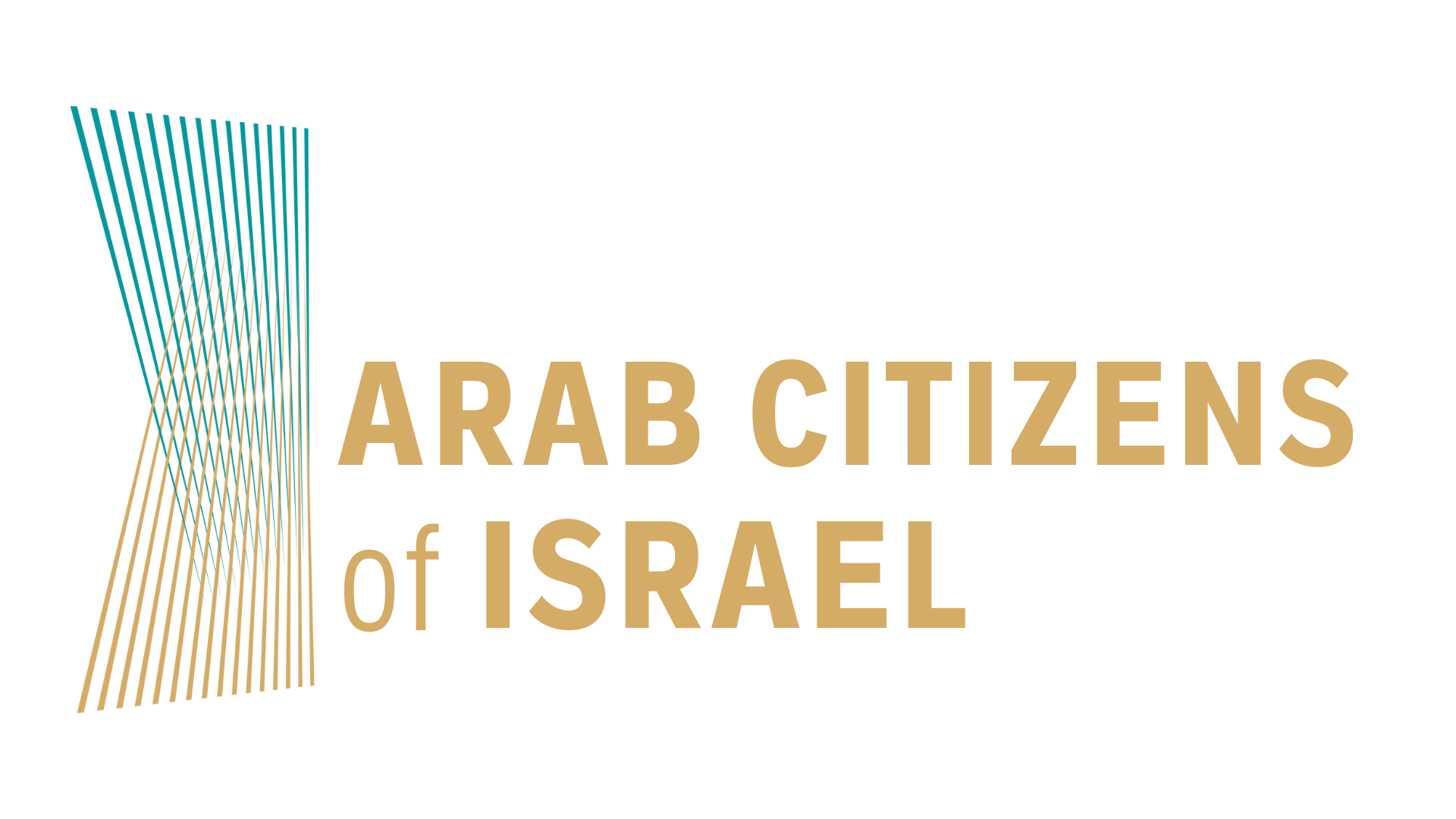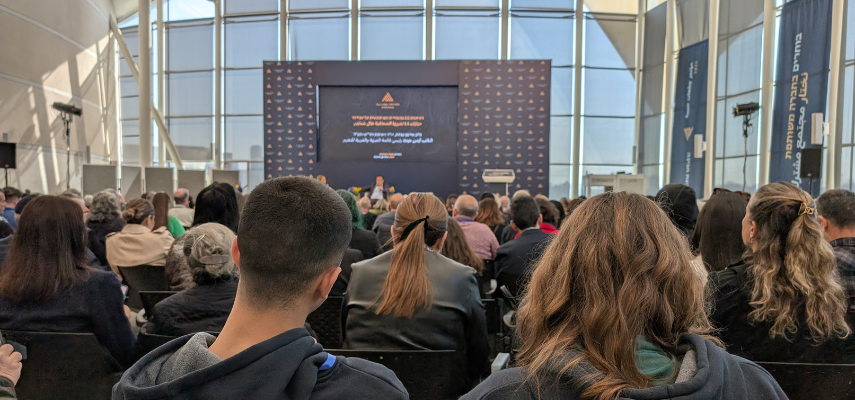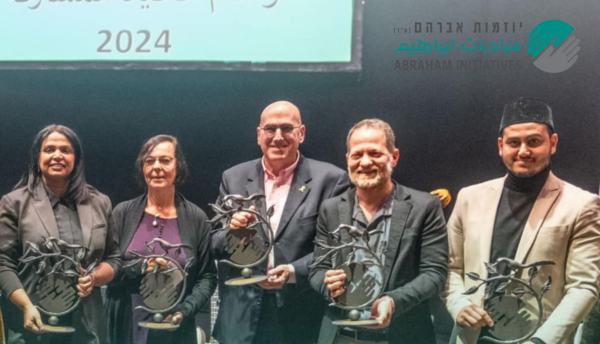The Givat Haviva Annual Conference “Shared Society in Emergency Times”
On Thursday, January 30, 2025, the annual Givat Haviva conference took place at the Yitzhak Rabin Center in Tel Aviv under the theme “Shared Society in Emergency Times.” It focused on the resilience of Israeli society, highlighting how its Jewish and Arab citizens have refrained from violence and maintained social stability throughout the ongoing war.
Michal Sela, CEO of Givat Haviva, opened the event with a powerful reflection: “We are living in dark moments. But from these moments, an inspiring layer of civil leadership is emerging. A leadership that understands that the end of the war and the return of the captives will be the moment to begin healing. It will not be a joyful or light moment, it will not be a celebratory moment, but it will be a window of opportunity, the kind that will not remain open for long if we do not seize it.” Hundreds of people attended the event, including politicians, leaders in local municipalities, NGOs, journalists, and government officials, all of whom were among the speakers and participants in the discussions.
During the conference, various initiatives that foster positive cooperation and constructive relationships between the populations were presented. Discussions centered on the role of leaders from different sectors—political, municipal, and social—in the long-term process of societal and national recovery, with an emphasis on shaping a shared vision for Jewish-Arab relations.
Key Findings
At the conference, Givat Haviva presented a study on the impact of the war on Jewish-Arab relations in Israel “Survey of Attitudes on Jewish-Arab Coexistence and a Shared Society in the Context of the Current Crisis” based on the fieldwork conducted between December 2023 and January 2024. The key findings:
- The events of October 7 and the war have significantly affected Jewish-Arab relations in Israel.
- About 70% of Jews and more than half of Arabs are pessimistic about the future of coexistence. While Arab society is more optimistic than Jewish society, Arabs fear violent encounters with law enforcement.
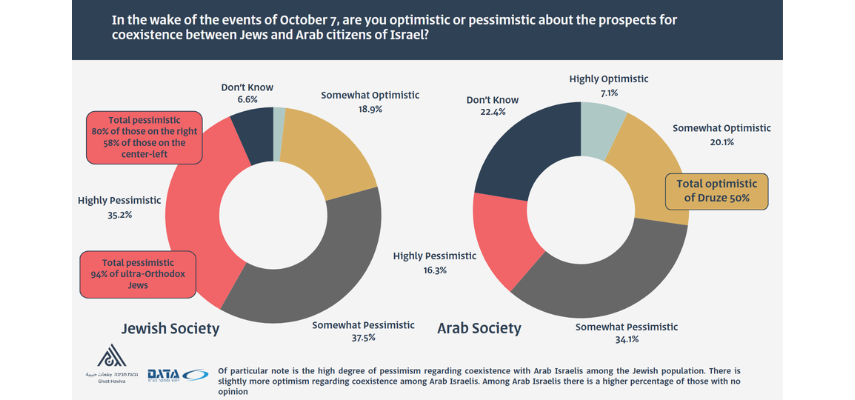
- There has been a decline in Jewish trust toward Arabs, with about half of Jews stating that hostility from Arabs toward them has increased. Likewise, Arab trust in Jews has decreased, with more Arabs reporting a rise in hostility from Jews.

- More than half of the Jewish respondents stated that their attitudes towards Arab citizens of Israel have changed for the worse. In the Arab community, half stated no change in their attitude towards Jews.
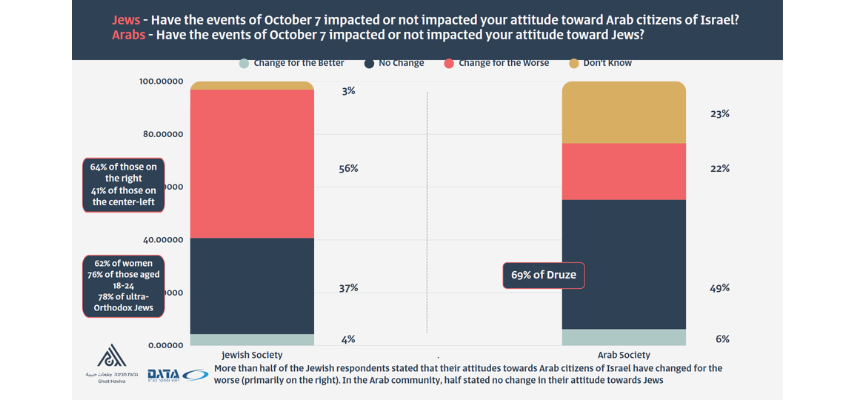
- Arab participation in a government coalition is viewed more positively within Arab society, with over half supporting it, compared to about a quarter of Jews. Among Arabs who support an Arab party joining the coalition, 90% also support ministerial positions in the government.
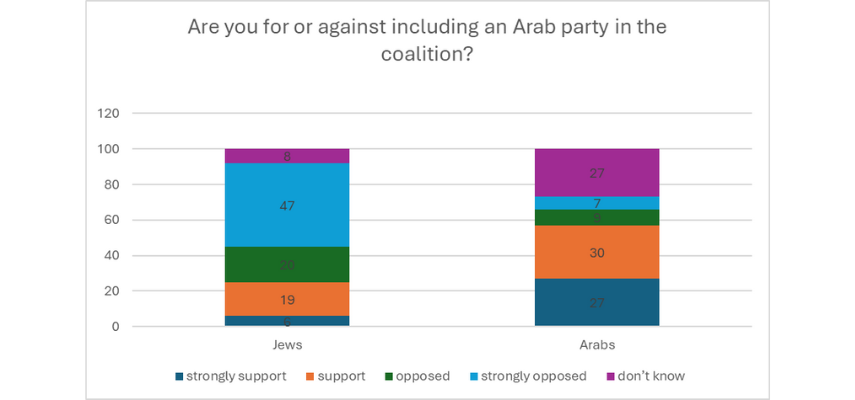
Mohammad Darawshe, Director of Strategy at Givat Haviva: “It is true that the level of fear and distrust is at its peak, but many of us at Givat Haviva are working to reduce this fear over time in order to decrease the tension. It is not only us, the civil society, that need to do this. The state can also take steps. Some of the steps it can take include promoting tolerance education. We must continue to cultivate and strengthen trust between the two communities and begin the healing process that has been damaged through educational, community, business, and political partnerships.”
Umm al-Fahm Mayor Samir Mahamid responded to the survey results, stating that since October 7, Arab society constantly feels the need to prove its loyalty. Meanwhile, the government is cutting budgets, failing to implement development plans (such as in transportation), and has removed Arab towns from the list of localities eligible for national priority funding.
Panels and Discussions
The final panel of the Givat Haviva Conference focused on the future of a shared society in Israel, bringing together prominent figures to discuss the path forward for Jewish-Arab relations. Hassan Towafra, from the Authority for Economic Development of Arab Society, Dr. Marian Tehawkho of the Aaron Institute for Economic Policy, and Liat Atzili, an educator who recently returned from captivity, shared their insights on the state of coexistence and the challenges and opportunities ahead.
Hassan Towafra opened the discussion by emphasizing the positive trajectory of shared society conversations over the past decade. He highlighted the need to harness this momentum in the coming years, focusing on the tremendous potential and benefits that coexistence offers. He stressed that fostering a shared society is not only about societal integration but also about creating economic opportunities that benefit all citizens.
Dr. Marian Tehawkho reflected on the economic progress of Arab society over the past ten years, noting that Arab households have seen the highest increase in income across the country. This growth has significantly contributed to Israel’s GDP, reducing reliance on subsidies and increasing tax revenues. She attributed much of this success to investments in Arab education and employment, which have been pivotal in promoting economic growth. However, Dr. Tehawkho pointed out that issues such as crime and social cohesion continue to pose challenges. She concluded that economic mobility and social integration must go hand in hand to ensure sustainable progress.
Liat Atzili brought an educational perspective to the conversation, stating that familiarity with “the other” has nearly disappeared from the education system. She stressed the importance of bridging these gaps to create a more cohesive society. Dr. Marian Tehawkho agreed, pointing to the Hebrew language barrier as a significant obstacle to integration.
Hassan Towafra concluded the panel by pointing to recent government resolutions, such as 992 and 550, which have led to significant developments in Arab communities, including cultural projects like museums, theaters, and conservatories. He saw these achievements as a promising sign of the potential for growth, particularly in the aftermath of crises. Now, he said, is the time to accelerate this momentum and build a hopeful, shared future for all Israelis.
Journalist Josh Breiner moderated the panel on civil insecurity at the annual Givat Haviva conference, beginning with the shocking statistic: only 15% of murder cases in Arab society are solved, compared to about 60% in Jewish society. This is a dismal figure by any global standard, with tens, if not hundreds, of murderers walking free. Ola Najmi-Yousef, director of the Jewish-Arab Center at Givat Haviva, responded, saying: “This affects us every day, in the street, in our lives. In the neighborhood, on the way to work, everywhere. For 16 years, state authorities were almost completely absent from Arab society, creating a vacuum. And as you know, there is no vacuum. Someone comes and fills that vacuum, and it’s filled by what we call crime organizations.” “There is no resident in Arab society who doesn’t want order and law,” she continued. “The question is how it is done. If the police enter Arab communities and treat the Arab citizen as an equal, they will be welcomed.”
At the conference, Moshe Arbel (Shas), Israel’s Minister of the Interior, opened the discussion by addressing the challenges posed by inequality in the country. He emphasized that decisions leading to the revocation of Israeli Arabs’ citizenship and the erosion of their rights severely damage the fabric of shared life in Israel. These actions, he argued, not only harm the dignity of Arab citizens but also violate their constitutional and Jewish right to equality.
Arbel stressed the vital role of leadership at all levels in the process of rebuilding the country. He underscored the importance of steering discourse toward understanding and cooperation, where conversations go beyond highlighting differences and instead focus on reconciliation and unity.
The conference also featured contributions from several members of Knesset, including Naama Lazimi and Gilad Kariv from The Democrats, and Ayman Odeh from The Joint List. Together, they highlighted the urgent need for concrete government initiatives to promote a shared society. Their proposals included repealing the controversial Nation-State Law, taking a stronger stance against crime, and establishing a dedicated Department for Democracy and Shared Society within the Ministry of Education to foster greater social cohesion.
Watch a virtual version of the conference here in English.
Full Survey in English.
How Can We Help?
Do you need support integrating these resources and issues into your philanthropic, communal, or Israel education work? Reach out for consultations, connections to experts, program support, training, or to plan your next event or mission. If you’ve used our resources, tell us about your experience!
